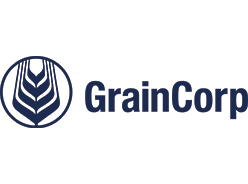GrainCorp Limited (GNC)
MD on GermanMalt Acquisition
25 July 2011 - MD & CEO: Alison Watkins
In this Open Briefing®, Alison discusses: - Strategic importance of GermanMalt acquisition - Valuation metrics in context of overall GrainCorp Malt business - Growth prospects for GermanMalt in Europe and developing export markets
openbriefing.com
GrainCorp Limited today announced the acquisition of GermanMalt GmbH & Co. KG for an enterprise value of EUR58 million (AUD~77 million at current exchange rates), including EUR18 million working capital. In an environment of change in the European malt sector, what is the strategic rationale for the acquisition and its timing?
MD & CEO Alison Watkins
The GermanMalt acquisition is consistent with the strategic themes we’ve enunciated previously, and it strengthens our overall malt strategy and portfolio. It also cements our position as a leading player in the international malt industry, and it’s a strategic acquisition timed to take advantage of the changing market conditions in Europe.
Malt exports from Europe are growing, and given that it is a leading barley and malt producing region, accounting for more than 35 percent of the world’s barley and malt production, around 20 percent of world barley exports and around 55 percent of world malt exports, it is important that GrainCorp has an active presence in that market.
As the European barley and malt sectors have a major influence on world markets, it is important that we have insight into what is happening in Europe as a market participant. What happens in Europe effects the markets our UK, North American and Australian operations supply.
GermanMalt also has very competitive inbound barley and outbound malt supply chains, particularly for the growth markets in Africa and South America. This also provides us with optional origin supply capability, which in turn increases our customer support capability, and as a consequence supports our malt exports from Australia and North America.
A base in Europe is also important because brewers are increasingly centralising their malt and barley procurement. Being “on the ground” in Europe will help us strength customer relationships, an important factor to consider in what is a very competitive malt market.
openbriefing.com
The acquisition price is equivalent to 7.5 times GermanMalt’s average EBITDA. This compares with the 5.7 times GrainCorp paid for its acquisition of the UMH malt business in 2009. What was the basis of your valuation of the business and what are the potential synergies with your existing malt business?
MD & CEO Alison Watkins
The malt industry is cyclical, and margins vary across the cycle. The price we paid for UMH was based on its last 12 months of earnings prior to acquisition, at a time when malt margins were at a high point in the cycle, translating into a relatively lower multiple. We didn’t reference an EBITDA average for UMH, as structurally the business changed quite a bit over that period. This makes it difficult to make a meaningful comparison of multiples for the two businesses.
The EBITDA multiple we’re paying for GermanMalt is good value, particularly when we take into account the synergies we expect to gain from the support GermanMalt will provide to our existing malt and grain businesses.
We expect to achieve benefits in barley procurement, and will benefit from our ability to take longer positions on barley than the previous owners, and to manage GermanMalt barley requirements as part of our international barley book.
openbriefing.com
Will the business require substantial capex? And how competitive is the GermanMalt supply chain?
MD & CEO Alison Watkins
The GermanMalt assets are in good condition and there is no need for major capex.
GermanMalt is well placed cost-wise compared with other malt producers in Europe, particularly when you consider access to barley supplies which is a critical driver of competitive advantage for any malt business.
The business has very competitive outbound supply chain links making it cost competitive to both domestic and export markets, particularly Africa and South America.
openbriefing.com
What are the growth opportunities for GermanMalt? Given the fragmented nature of the German/European malt market, are there consolidation opportunities?
MD & CEO Alison Watkins
The growth opportunities for GermanMalt in its own right are very positive. It has an established and relatively stable local customer base, as well as significant export business into the African and South America growth markets.
There are also opportunities for GermanMalt within GrainCorp Malt. In particular the opportunity to enhance our service offering to brewer customers who operate in multiple markets. It’s attractive for them to deal with a maltster who can meet their barley and malt needs across multiple geographies.
Our core business is based on grain, and barley is one of our areas of expertise. Australia is a major barley producer and exporter. GermanMalt, along with our grain marketing presence in Europe through our recently established office in Hamburg, place us well to utilise that barley expertise in our malt business and to add substantial value for our customers.
openbriefing.com
Given the marketing office in Hamburg, could the needs of your major international clients have been met without GrainCorp having to actually own the production assets?
MD & CEO Alison Watkins
Our strategy is to be an “end to end” supplier of grain and processed grain to domestic and international consumers. Owning downstream processing assets to generate and capture value beyond that available through third party sourcing is at the heart of this strategy.
From the brewers’ point of view, dealing with the owner of malting assets gives them confidence that their quality and supply needs will be met. Malt is not a readily tradable product like other soft commodities, because end consumers (brewers and whisky distillers) and maltsters typically deal direct with each other. So dealing with a manufacturer that can supply from multiple origins, in our case Germany, the UK, Canada north western USA and Australia, is a strategic advantage that has been enhanced with this acquisition.
While third party trading or asset “swaps” may well be part of our overall malt portfolio in the longer term, it makes perfect sense for us to own malt processing assets in Europe, as this is the most influential barley, malt and beer market in the world.
openbriefing.com
As at the end of March 2011 GrainCorp had core debt of AUD228 million and gearing of 15 percent. How will net debt and gearing be affected by the GermanMalt acquisition? What balance sheet capacity is available for further acquisitions?
MD & CEO Alison Watkins
The acquisition will be funded with a combination of term debt and working capital facilities. Our core debt at the end of the first half was at a high point, reflecting our seasonal working capital needs and the relatively large 2010/2011 winter crop harvest. The acquisition will increase core debt gearing by about 4 percent. We expect to remain comfortably below our core debt maximum gearing target of 25 percent, providing us with further debt-funding capacity if needed.
openbriefing.com
Thank you Alison.
For more information about GrainCorp, visit www.graincorp.com.au or call Reid Doyle, Investor Relations Manager, on +61 2 9266 9217
DISCLAIMER: Orient Capital Pty Ltd has taken all reasonable care in publishing the information contained in this Open Briefing®; furthermore, the entirety of this Open Briefing® has been approved for release to the market by the participating company. It is information given in a summary form and does not purport to be complete. The information contained is not intended to be used as the basis for making any investment decision and you are solely responsible for any use you choose to make of the information. We strongly advise that you seek independent professional advice before making any investment decisions. Orient Capital Pty Ltd is not responsible for any consequences of the use you make of the information, including any loss or damage you or a third party might suffer as a result of that use.
Latest Open Briefings 
14 Feb 2024
GrainCorp AGM - FY23
16 Nov 2023
GrainCorp FY23 Results Briefing
11 May 2023
HY23 results call
16 Feb 2023
GrainCorp AGM - FY22
16 Nov 2022
GrainCorp FY22 Results briefing












